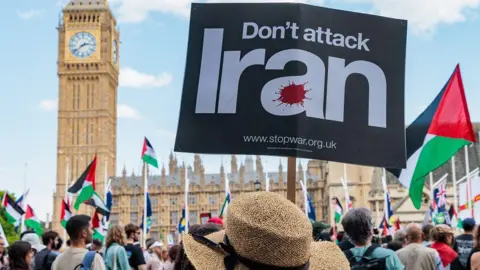The ongoing tensions in the Middle East, particularly between Iran and Israel, have prompted considerable speculation regarding the United Kingdom’s potential involvement in any military escalation. The British public may recall the controversial 2003 invasion of Iraq, which was led by the United States. Back then, UK forces acted under the premise of eliminating weapons of mass destruction, which were later found to be non-existent. Today, concerns are resurfacing about whether the UK might again become embroiled in international conflict, particularly if the U.S. decides to take military action against Iran to thwart its nuclear ambitions.
As America’s enduring ally, Britain could find itself significantly impacted if the situation escalates. If U.S. President Donald Trump decides on a direct military intervention, the question arises about what role the UK might be expected to play. However, it is important to note that the UK is not the central player in the current Israel-Iran confrontation. Despite calls for de-escalation from the G7 nations, including the UK, Israel appears determined to pursue direct action against what it perceives as an existential threat posed by Iran’s nuclear program.
The relationship between the UK and Israel has further complicated matters. Recent sanctions imposed by the UK on two Israeli cabinet ministers, criticized for urging violence against Palestinians, have strained the diplomatic ties between the two nations. These developments have led Israel to act independently, conducting military operations in relation to Iran without consulting the UK, which it does not regard as a reliable partner at the moment.
Despite the complexities of the diplomatic landscape, the UK’s role remains significant, particularly through its connections with European allies who were instrumental in formulating the 2015 Joint Comprehensive Plan of Action (JCPOA) regarding Iran’s nuclear program. Following the U.S. withdrawal from the agreement in 2018 under Trump, Western relations with Iran have increasingly deteriorated. Currently, UK Foreign Secretary David Lammy is in Washington to discuss the situation further, while the UK also participates in upcoming discussions with France and Germany concerning Iran’s nuclear activities in Geneva.
The UK maintains essential military and strategic assets in the region. A noteworthy base is Diego Garcia, a small island in the Indian Ocean that the UK jointly operates with the United States. Its strategic location, roughly 2,300 miles from Iran, allows for it to serve as a staging area for U.S. Air Force B2 Spirit bombers, capable of striking deep underground facilities in Iran, such as the nuclear site at Fordo. British legal principles, however, mandate that any military support provided by the UK should be defensive in nature to comply with international law.
Cyprus also offers two crucial UK military installations, namely the RAF Akrotiri and the signals intelligence facility at Ayios Nikolaos. RAF Akrotiri, home to Typhoon jets, has been actively engaged in operations across the region, even aiding in intercepting incoming Iranian aerial threats during previous conflicts between Israel and Iran. Nonetheless, current statements suggest that there have been no requests for UK assistance in ongoing military activities.
British maritime forces, particularly the Royal Navy, also play a pivotal role in keeping critical maritime chokepoints like the Strait of Hormuz free from threats, although their effectiveness has been challenged by the aging fleet and diminishing presence. With the Royal Navy’s assets increasingly stretched thin, there are legitimate concerns regarding the UK’s capacity to maintain operations in a potential conflict scenario.
Iran has communicated its intention to retaliate against any nation it perceives as an aggressor, which would include the UK should it allow U.S. forces to operate from its bases for an attack on Iran. This poses significant risks to British interests, both abroad and domestically, increasing the vigilance of MI5, the UK’s internal security service, against any retaliatory actions from Iran.
In conclusion, the potential for the UK to become embroiled in a renewed conflict in the Middle East raises significant concerns. While direct involvement may not appear imminent, the intricate diplomatic ties and military preparations underscore a precarious position at the nexus of international power struggles. As tensions rise, the UK’s responses will require careful navigation to avoid repeating the misjudged interventions of the past.



